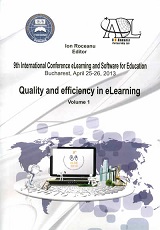LEARNING FOREIGN LANGUAGES BY USING E-LEARNING PLATFORMS
LEARNING FOREIGN LANGUAGES BY USING E-LEARNING PLATFORMS
Author(s): Monica Condruz–BăcescuSubject(s): Education
Published by: Carol I National Defence University Publishing House
Keywords: e-learning platforms; communication; research; course; teachers; life-long learning
Summary/Abstract: The article deals with the idea of using e-learning platforms in order to acquire foreign languages. Computer assisted language learning is often considered a teaching method. Nowadays, teachers look for new ways to better develop students communication competencies. E-learning platforms represent the most important tools in language learning. Using the Internet in education, along with other additional tools, promotes access to real-time information exchange and international cooperation and offer new opportunities for learning - teaching. Furthermore, the article gives some examples of e-learning platforms and also emphasizes the advantages of using them. E-learning is addressed to all those who want to learn, regardless of age or training. It is thus an option of lifelong learning in the information society. Learning methods based on e-learning manage to adapt the educational process to the real needs of students and offer access to relevant and updated information. The main benefits of e-learning platforms are considered to be: individual skill development and team work, development of analysis skills and synthesis of information and the ability to put into practice the theoretical knowledge learned in school. I tend to believe that e-learning represents a new revolution in education and the current role of the teacher becomes obsolete. Experts believe that e-learning fully meet market and modern society demands and help create more economic and social opportunities. Globally speaking e-learning plays an increasingly important role in education and the effects of introducing new technologies in schools bring major effects, helping to develop the whole society. Students are free to enroll in a course or another, and are free to leave the course if it is ineffective. In conclusion, computers will never replace teachers, but teachers who use computers will replace those who do not use them.
Journal: Conference proceedings of »eLearning and Software for Education« (eLSE)
- Issue Year: 9/2013
- Issue No: 01
- Page Range: 597-603
- Page Count: 7
- Language: English

